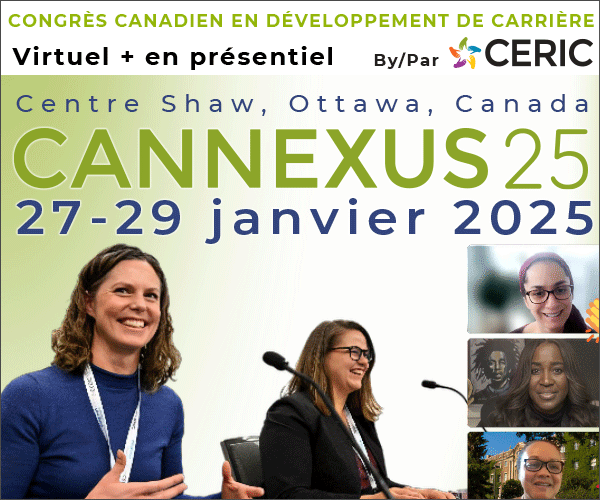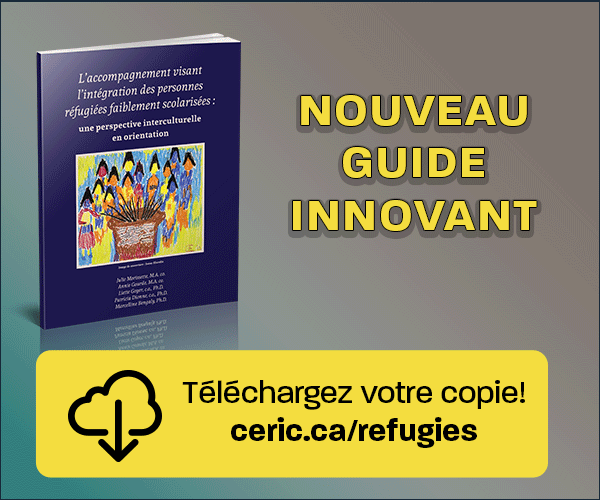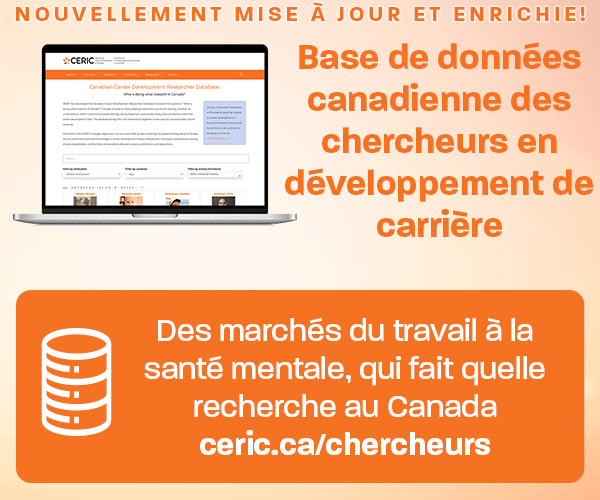Pas seulement pour les étudiants de premier cycle : examen d'un cours universitaire de gestion de carrière basé sur la narration pour les étudiants diplômés en ingénierie
Mots-clés :
career planning courses, narrative career development, qualitative research, graduate students, career management, social constructivismRésumé
The experiences of graduate engineering students enrolled in a credit-bearing, career management course at a Canadian University were explored from a narrative perspective. Scant literature exists on the outcomes of career planning courses at the graduate level, largely because these classes tend to be aimed at undergraduate students. Individual interviews were conducted with 10 students who completed the semester-length course. The inquiry focused on students’ life-career plans and their experiences in the course. Applying social constructivism to career development as a theoretical framework, thematic analysis was used to generate results in the form of three main thematic categories. These categories included: fostering career awareness and exploration skills; finding affiliation with others; and developing optimism and confidence. Findings highlight the benefits for graduate students who are offered opportunities to develop career planning skills through credit bearing courses. Implications for practice, policy, and research exist based on the data analysis, including alternative strategies to incorporate life-career planning skills into graduate-level coursework.
Références
Abkhezr, P., McMahon, M., Glasheen, K., & Campbell, M. (2018). Finding voice through narrative storytelling: An exploration of the career development of young African females with refugee backgrounds. Journal of Vocational Behavior, 105, 17-30. doi: https://doi.org/10.1016/j.jvb.2017.09.007
Aoun, J. (2017). Robot-proof: Higher education in the age of artificial intelligence. Cambridge, MA: MIT.
Bevan, S., Brinkley, I., Bajorek, Z., & Cooper, C. L. (2018). 21st century workforces and workplaces: The challenges and opportunities for future work practices and labour markets. London: Bloomsbury Business.
Bott, E.M., Duffy, R.D., Borges, N.J., Braun, T.L., Jordan, K.P., & Marino, J.F. (2017). Called to medicine: Physicians' experiences of career calling. Career Development Quarterly, 65(2), 113-130. doi: 10.1002/cdq.12086
Braun, V., & Clarke, V. (2006). Using thematic analysis in psychology. Qualitative Research in Psychology, 3(2), 77-101. doi: 10.1191/1478088706qp063oa
Brott, P.E. (2005). A constructivist look at life roles. Career Development Quarterly, 54(2), 138-149. doi:10.1002/j.2161-0045.2005.tb00146.x
Brynjolfsson, E., & McAfee, A. (2016). The second machine age: Work, progress, and prosperity in a time of brilliant technologies. New York, NY: W.W. Norton.
Bujold, C. (2004). Constructing career through narrative. Journal of Vocational Behavior, 64(3), 470-484. doi: 10.1016/j.jvb.2003.12.010
Callanan, G.A., Perri, D.F., & Tomkowicz, S.M. (2017). Career management in uncertain times: Challenges and opportunities. The Career Development Quarterly, 65(4), 353-365. doi: 10.1002/cdq.12113
Cassuto, L. (2014). More than one possible future: Stop forcing graduate students to segregate job searches between departments and career services. The Chronicle of Higher Education, 60(27), 29-30.
Cox, D. W., Rasmussen, K. L., Jacobson, J. D., Wells, K. J., Rettew, J. G., & Sirridge, K. (2006). Effects of an intervention to increase students’ level of occupational engagement. Poster presented at the Annual Convention of the American Psychological Association, San Francisco, CA.
Creswell, J.W., & Miller, D.L. (2000). Determining validity in qualitative inquiry. Theory into practice, 39(3), 124-130. doi: 10.1207/s15430421tip39032
Creswell, J.W., & Poth, C.N. (2018). Qualitative inquiry and research design (4th ed.). Thousand Oaks, CA: SAGE.
Denzin, N.K. (1989). Interpretive interactionism. Newbury Park, CA: SAGE.
Folsom, B., & Reardon, R. (2003). College career courses: Design and accountability. Journal of Career Assessment, 11, 421-450. doi: 10.1177/1069072703255875
Fouad, N.A., Ghosh, A., Chang, W.-h., Figueiredo, C., & Bachhuber, T. (2016). Career exploration among college students. Journal of College Student Development, 57(4), 460-464. doi: 10.1353/csd.2016.0047
Fox, K.F. (2018). Leveraging a leadership development framework for career readiness. In K. K. Smith, G. S. Rooney & G. Spencer (Eds.), New Directions for Student Leadership (Vol. 157, pp. 13-26). San Francisco, CA: Wiley.
Franklin, M. (2015). CareerCycles: A holistic and narrative method of practice. In B.C. Shepard, P.S. Mani (Eds.), Career development practice in Canada: Perspectives, principles, and professionalism (pp. 441-463). Toronto, CA: CERIC.
Franklin, M., & Feller, R. (2017). Using the one life tools framework: From clarification to intentional exploration with East Asian female. In L. Busacca & M. Rehfuss (Eds.), Postmodern career counseling: A handbook of culture, context and cases (pp. 273-284). Alexandria, VA: American Counseling Association.
Franklin, M., Yanar, B., & Feller, R. (2015). Narrative method of practice increases curiosity and exploration, psychological capital, and personal growth leading to career clarity: A retrospective outcome study. The Canadian Journal of Career Development, 14(2), 12-23.
Glavin K.W., Haag R.A., & Forbes L.K. (2017). Fostering career adaptability and resilience and promoting employability using life design counseling. In K. Maree (eds.) Psychology of career adaptability, employability and resilience (pp. 433-445). New York, NY: Springer.
Grier-Reed, T., & Ganuza, Z.M. (2011). Constructivism and career decision self-efficacy for Asian Americans and African Americans. Journal of Counseling & Development, 89(2), 200-205. doi: 10.1002/j.1556-6678.2011.tb00078.x
Hansen, L.S. (2001). Integrating work, family, and community through holistic life planning. The Career Development Quarterly, 49(3), 261-274. doi: 10.1002/j.2161-0045.2001.tb00570.x
Hansen, J.M., Jackson, A.P., & Pedersen, T.R. (2017). Career development courses and educational outcomes. Journal of Career Development, 44(3), 209-223. doi: doi:10.1177/0894845316644984
Hobin, J.A., Clifford, P.S., Dunn, B.M., Rich, S., & Justement, L.B. (2014). Putting PhDs to work: Career planning for today’s scientist. CBE - Life Sciences Education, 13(1), 49-53. doi: 10.1187/cbe-13-04-0085
Hodges, N. (2011). Qualitative research: A discussion of frequently articulated qualms (faqs). Family and Consumer Sciences Research Journal, 40(1), 90-92. doi:10.1111/j.1552-3934.2011.02091.x
Hung, J. (2002). A career development course for academic credit: An outcome analysis. Canadian Journal of Career Development, 1(1), 22-27.
Lent, R.W., Schmidt, J.A., & Larkin, K. (1985). A course in science and technology careers for returning adult students. Journal of College Student Personnel, 26, 248-249.
Maverick, L.A. (1926). The vocational guidance of college students. Cambridge, MA: Harvard University Press.
Morrow, S.L. (2005). Quality and trustworthiness in qualitative research in counseling psychology. Journal of Counseling Psychology, 52(2), 250-260. doi: 10.1037/0022-0167.52.2.250
National Association of Colleges and Employers. (n.d.). Career readiness defined. Retrieved from http://www.naceweb.org/career-readiness/competencies/career-readiness-defined
Peavy, V.R. (1992). A constructivist model of training for career counselors. Journal of Career Development, 18(3), 215-228. doi: 10.1007/BF01321713
Polkinghorne, D.E. (1988). Narrative knowing and the human sciences. Albany, N. Y.: State University of New York Press.
Polkinghorne, D.E. (1995). Narrative configuration in qualitative analysis. In J. Hatch & R. Wisniewski (Eds.), Life history and narrative (pp. 5-23). Bristol, PA: Falmer.
Reardon, R. C., Melvin, B., McClain, M.-C., Peterson, G.W., & Bowman, W.J. (2015). The career course as a factor in college graduation. Journal of College Student Retention: Research, Theory & Practice, 17(3), 336-350. doi: 10.1177/1521025115575913.
Reardon, R., & Fiore, E. (2014, June 5). College career courses and learner outputs and outcomes, 1976–2014: Technical Report, No. 55. Tallahassee, FL.
Richardson, M.S. (2004). The emergence of new intentions in subjective experience: A social/personal constructionist and relational understanding. Journal of Vocational Behavior, 64(3), 485-498. doi: 10.1016/j.jvb.2003.12.011
Rottinghaus, P.J., Falk, N.A., & Park, C.J. (2018). Career assessment and counseling for stem: A critical review. Career Development Quarterly, 66(1), 2-34. doi: 10.1002/cdq.12119
Saldaña, J. (2009). The coding manual for qualitative researchers. Thousand Oaks, CA: SAGE.
Savickas, M.L. (1993). Career counseling in the postmodern era. Journal of Cognitive Psychotherapy: An International Quarterly, 7(3), 205-215.
Savickas, M.L. (2011). Constructing careers: Actor, agent, and author. Journal of Employment Counseling, 48(4), 179-181. doi: 10.1177/0011000012468339
Savickas, M.L. (2012). Life design: A paradigm for career intervention in the 21st century. Journal of Counseling & Development, 90(1), 13-19. doi: 10.1111/j.1556-6676.2012.00002.x
Stebleton, M.J. (2010). Narrative-based career counseling perspectives in times of change: An analysis of strengths and limitations. Journal of Employment Counseling, 47(2), 64-78. doi: 10.1002/j.2161-1920.2010.tb00091.x
Stebleton, M. J., & Franklin, M. (2017). Positive impact of career planning courses: Applying narrative approaches to empower teaching and practice. Career Convergence. National Career Development Association. Retrieved from: https://aws4production.associationdatabase.com/aws/NCDA/pt/sd/news_article/143685/_PARENT/CC_layout_details/false
Super, D.E. (1990). A life-span, life-span approach to career development. In D. B. L. Brook (Ed.), Career choice and development: Applying contemporary theories to practice (pp. 197-261). San Francisco, CA: Jossey-Bass.
Taylor, J.M., & Savickas, S. (2016). Narrative career counseling: My career story and pictorial narratives. Journal of Vocational Behavior, 97, 68-77. doi: https://doi.org/10.1016/j.jvb.2016.07.010
Thompson, E., & Feldman, D.B. (2010). Let your life speak: Assessing the effectiveness of a program to explore meaning, purpose, and calling with college students. Journal of Employment Counseling, 47(1), 12-19. doi: 10.1002/j.2161-1920.2010.tb00086.x
Wang, L. (2016). ACS launches career planning tool for graduate students and postdocs. Chemical & Engineering News, 94(12), 43. Retrieved from https://cen.acs.org/articles/94/i12/ACS-launches-career-planning-tool.html
Young, R.A., & Collin, A. (2004). Introduction: Constructivism and social constructionism in the career field. Journal of Vocational Behavior, 64(3), 373-388. doi: 10.1016/j.jvb.2003.12.005
Zikic, J., & Franklin, M. (2010). Enriching careers and lives: Introducing a positive, holistic, and narrative career counseling method that bridges theory and practice. Journal of Employment Counseling, 47(4), 180-189. doi: 10.1002/j.2161-1920.2010.tb00102.x

Téléchargements
Publié-e
Comment citer
Numéro
Rubrique
Licence
(c) Tous droits réservés REVUE CANADIENNE DE DÉVELOPPEMENT DE CARRIÈRE 2019

Cette œuvre est sous licence Creative Commons Attribution - Pas d'Utilisation Commerciale - Pas de Modification 4.0 International.











